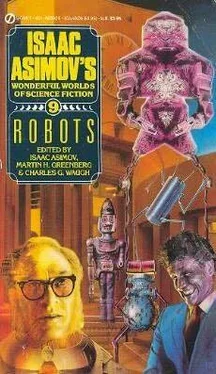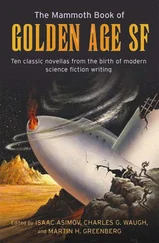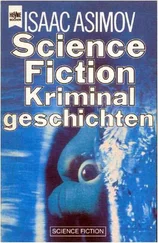Frederik Pohl - Isaac Asimov's Worlds of Science Fiction. Book 9 - Robots
Здесь есть возможность читать онлайн «Frederik Pohl - Isaac Asimov's Worlds of Science Fiction. Book 9 - Robots» весь текст электронной книги совершенно бесплатно (целиком полную версию без сокращений). В некоторых случаях можно слушать аудио, скачать через торрент в формате fb2 и присутствует краткое содержание. Год выпуска: 1989, ISBN: 1989, Издательство: Robinson Publishing, Жанр: Фантастика и фэнтези, на английском языке. Описание произведения, (предисловие) а так же отзывы посетителей доступны на портале библиотеки ЛибКат.
- Название:Isaac Asimov's Worlds of Science Fiction. Book 9: Robots
- Автор:
- Издательство:Robinson Publishing
- Жанр:
- Год:1989
- ISBN:ISBN: 1-85487-041-6
- Рейтинг книги:4 / 5. Голосов: 1
-
Избранное:Добавить в избранное
- Отзывы:
-
Ваша оценка:
- 80
- 1
- 2
- 3
- 4
- 5
Isaac Asimov's Worlds of Science Fiction. Book 9: Robots: краткое содержание, описание и аннотация
Предлагаем к чтению аннотацию, описание, краткое содержание или предисловие (зависит от того, что написал сам автор книги «Isaac Asimov's Worlds of Science Fiction. Book 9: Robots»). Если вы не нашли необходимую информацию о книге — напишите в комментариях, мы постараемся отыскать её.
Isaac Asimov's Worlds of Science Fiction. Book 9: Robots — читать онлайн бесплатно полную книгу (весь текст) целиком
Ниже представлен текст книги, разбитый по страницам. Система сохранения места последней прочитанной страницы, позволяет с удобством читать онлайн бесплатно книгу «Isaac Asimov's Worlds of Science Fiction. Book 9: Robots», без необходимости каждый раз заново искать на чём Вы остановились. Поставьте закладку, и сможете в любой момент перейти на страницу, на которой закончили чтение.
Интервал:
Закладка:
Jorgen studied them for long minutes, while the little wind brought the clean scents of the planet to his nose. It would have been pleasant to stay here now, but his presence would have been fatal to the plan. It didn't matter, really; in a few years, death would claim him, and there were no others of his kind to fill those years or mourn his passing when it came. This was a better way. He knew enough of the ship to guide it up and outward, into the black of space against the cold, unfriendly stars, to drift on forever toward no known destination, an imperishable mausoleum for him and the dead who were waiting inside. At present, he had no personal plans; perhaps he would live out his few years among the books and scientific apparatus on board, or perhaps he would find release in one of the numerous painless ways. Time and his own inclination could decide such things later. Now it was unimportant. There could be no happiness for him, but in the sense of fulfillment there would be some measure of content. The gods were no longer laughing.
He moved a few feet toward the ship and stopped, sweeping his eyes over the river and hills again, and letting his vision play with the city Five had described. No, he could not see it with robots populating it, either; but that, too, was conditioning. On the surface, the city might be different, but the surface importance was only a matter of habit, and the realities lay in the minds of the builders who would create that city. If there was no laughter in the world to come, neither would there be tears or poverty or misery such as had ruled too large a portion of his race.
Standing there, it swam before his eyes, paradoxically filled with human people, but the same city in spirit as the one that would surely rise. He could see the great boats in the harbor with others operating up the river. The sky suddenly seemed to fill with the quiet drone of helicopters, and beyond, there came the sound of rockets rising toward the eighth and ninth worlds, while others were building to quest outward in search of new suns with other worlds.
Perhaps they would find Earth, some day in their expanding future. Strangely, he hoped that they might, and that perhaps they could even trace their origin, and find again the memory of the soft protoplasmic race that had sired them. It would be nice to be remembered, once that memory was no longer a barrier to their accomplishment. But there were many suns, and in long millennia, the few connecting links that could point out the truth to them beyond question might easily erode and disappear. He could never know.
Then the wind sighed against him, making a little rustling sound, and he looked down to see something flutter softly in the hand of Five. Faint curiosity carried him forward, but he made no effort to remove it from the robot's grasp, now that he saw its nature.
Five, too, had thought of Earth and their connection with it, and had found the answer, without breaking his orders. The paper was a star map, showing a sun with nine planets, one ringed, some with moons, and the third one was circled in black pencil, heavily. They might not know why or what it was when they awoke, but they would seek to learn; and someday, when they found the sun they were searching for, guided by the unmistakable order of its planets, they would return to Earth. With the paper to guide them, it would be long before the last evidence was gone, while they could still read the answer to the problem of their origin.
Jorgen closed the metal hand more closely about the paper, brushed a scrap of dirt from the head of the robot, and then turned resolutely back toward the ship, his steps firm as he entered and closed the lock behind him. In a moment, with a roar of increasing speed, it was lifting from the planet, leaving five little men lying on the sand behind, close to the murmuring of the sea-five little metal men and a dream!
Soldier Boy
by Michael Shaara
In the northland, deep, and in a great cave, by an everburning fire the Warrior sleeps. For this is the resting time, the time of peace, and so shall it be for a thousand, years. And yet we shall summon him again, my children, when we are sore in need, and out of the north he will come, and again and again, each time we call, out of the dark and the cold, with the fire in his hands, he will come. -Scandinavian legend Throughout the night thick clouds had been piling in the north; in the morning it was misty and cold. By eight o'clock a wet, heavy, snow-smelling breeze had begun to set in, and because the crops were all down and the winter planting done, the colonists brewed hot coffee and remained inside. The wind blew steadily, icily, from the north. It was well below freezing when, sometime after nine, an army ship landed in a field near the settlement.
There was still time. There were some last brief moments in which the colonists could act and feel as they had always done. They therefore grumbled in annoyance. They wanted no soldiers here. The few who had convenient windows stared out with distaste and a mild curiosity, but no one went out to greet them.
After a while a rather tall, frail-looking man came out of the ship and stood upon the hard ground looking toward the village. He remained there, waiting stiffly, his face turned from the wind. It was a silly thing to do. He was obviously not coming in, either out of pride or just plain orneriness.
"Well, I never," a nice lady said.
"What's he just standing there for?" another lady said.
And all of them thought: Well, God knows what's in the mind of a soldier, and right away many people concluded that he must be drunk. The seed of peace was deeply planted in these people, in the children and the women, very, very deep. And because they had been taught, oh, so carefully, to hate war, they had also been taught, quite incidentally, to despise soldiers.
The lone man kept standing in the freezing wind.
Eventually, because even a soldier can look small and cold and pathetic, Bob Rossel had to get up out of a nice, warm bed and go out in that miserable cold to meet him.
The soldier saluted. Like most soldiers, he was not too neat and not too clean, and the salute was sloppy. Although he was bigger than Rossel he did not seem bigger. And, because of the cold, there were tears gathering in the ends of his eyes.
"Captain Dylan, sir." His voice was low and did not carry. "I have a message from Fleet Headquarters. Are you in charge here?"
Rossel, a small sober man, grunted. "Nobody's in charge here. If you want a spokesman I guess I'll do. What's up?"
The captain regarded him briefly out of pale-blue, expressionless eyes. Then he pulled an envelope from an inside pocket, handed it to Rossel. It was a thick, official-looking thing and Rossel hefted it idly. He was about to ask again what was it all about when the airlock of the hovering ship swung open creakily. A beefy, black-haired young man appeared unsteadily in the doorway, called to Dylan.
"C'n I go now, Jim?"
Dylan turned and nodded.
"Be back for you tonight," the young man called, and then, grinning, he yelled, "Catch," and tossed down a bottle. The captain caught it and put it unconcernedly into his pocket while Rossel stared in disgust. A moment later the airlock closed and the ship prepared to lift.
"Was he drunk?" Rossel began angrily. "Was that a bottle of liquor?"
The soldier was looking at him calmly, coldly. He indicated the envelope in Rossel's hand. "You'd better read that and get moving. We haven't much time."
He turned and walked toward the buildings and Rossel had to follow. As Rossel drew near the walls the watchers could see his lips moving but could not hear him. Just then the ship lifted and they turned to watch that and followed it upward, red spark-tailed, into the gray, spongy clouds and the cold.
Читать дальшеИнтервал:
Закладка:
Похожие книги на «Isaac Asimov's Worlds of Science Fiction. Book 9: Robots»
Представляем Вашему вниманию похожие книги на «Isaac Asimov's Worlds of Science Fiction. Book 9: Robots» списком для выбора. Мы отобрали схожую по названию и смыслу литературу в надежде предоставить читателям больше вариантов отыскать новые, интересные, ещё непрочитанные произведения.
Обсуждение, отзывы о книге «Isaac Asimov's Worlds of Science Fiction. Book 9: Robots» и просто собственные мнения читателей. Оставьте ваши комментарии, напишите, что Вы думаете о произведении, его смысле или главных героях. Укажите что конкретно понравилось, а что нет, и почему Вы так считаете.









